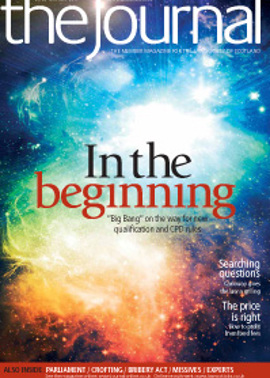Power in name only?
Have you experienced difficulty getting a bank to recognise and give effect to a continuing power of attorney? If so, the Society’s Mental Health & Disability Law Committee would like to hear from you. The same applies to certificates of other appointments issued by the Office of the Public Guardian.
Now you might expect any bank to be long familiar with the concept of a power of attorney, and in particular to accept a copy document authenticated by the Office of the Public Guardian following the registration of a continuing power of attorney as required by the Adults with Incapacity (Scotland) Act 2000. Likewise, you would expect them to be familiar with certificates of appointment of withdrawers, financial guardians and persons authorised under intervention orders. But according to committee convener Adrian Ward, the truth is rather different.
Whether in connection with certificates of registration, or withdrawal certificates under the Access to Funds Scheme, it is only too common to find a bank not processing or implementing a certificate properly when it is presented.
“I had a recent case under the Access to Funds Scheme”, says Ward. “I got the certificate of withdrawal but when my client took it to the bank they didn’t know what to do with it. They put it into force in part but said they couldn’t stop standing orders.”
He adds that there are “innumerable cases” of banks not accepting an official copy of a power of attorney document with registration certificate, although it is expressly stated in the Act to warrant the contents of the original. And difficulties can occur with any of the clearing banks or other financial institutions, irrespective of where they are based.
The problem appears to be a part training, part communication issue. Senior managers and advisers are well aware of the position in law; it is staff at the local branches who often appear unfamiliar with the status of the documents.
Although having personal experience of the type of problem, much of the information reaching the committee members is anecdotal. However the frequency of instances appears to be such that they are inviting solicitors to pass them details of specific cases that they can then take up with the banks and other institutions.
Initially it is hoped to meet with the association representing the banks, to press the case for better consistency of practice. Ward however believes that there could be a discrimination issue involved, and that it might prove to be appropriate to approach the Equality & Human Rights Commission about the possibility of it lending its support if necessary. “If a bank failed to take account of the needs of a wheelchair user, that would clearly be discrimination”, he says. “With a mental disability, the certificate is the mechanism to overcome the disability, and if the banks fail to recognise it, the result is in effect the same.”
He adds: “Hopefully we will get some case histories that are so clear cut that we can run them as test cases. We want to show there is a generic problem that requires an urgent solution.”
But he hopes that the banks and other institutions can be persuaded to act without formal proceedings being taken against them – an outcome that the Commission too would attempt to achieve.
Solicitors willing to pass on details of specific cases should send them to Brian Simpson, Law Reform Department, at the Society (e: briansimpson@lawscot.org.uk).In this issue
- Experience not to be missed
- Call in the experts
- Planning to deliver
- Stars of the future
- Registered Paralegal Scheme hits the mark
- CPD: a personal quest
- Wha's like us?
- Holyrood: a verdict
- Public ethos
- Power in name only?
- From the Brussels office
- Minority voices
- Law reform update
- Quinn Direct - when to intimate?
- Name your price
- Ask Ash
- Communication breakdown - a major risk issue
- Interested parties
- Support from afar
- Plus ça change?
- Where the state has to stop
- A NEST egg?
- Scottish Solicitors' Discipline Tribunal
- Website review
- Book reviews
- Above board
- Ruaig an Fhèidh
- The price of breach






